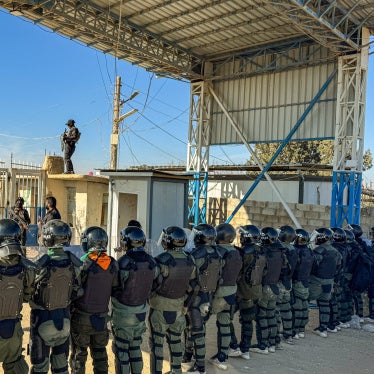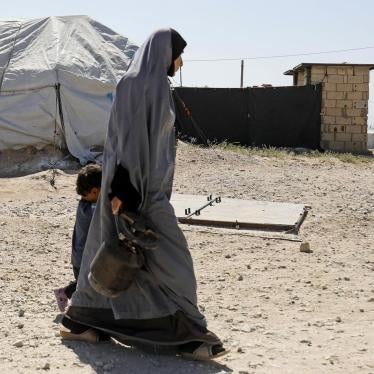The U.N. Security Council must authorize the proposed United Nations mission in Darfur to use force as necessary to protect civilians, Human Rights Watch said in a briefing paper released today. On April 26, the U.N. Department of Peacekeeping Operations (DPKO) is scheduled to brief the Security Council on options for a U.N. mission in Darfur.
In the face of Sudanese government hostility to a U.N. operation and continuing attacks against the civilian population in Darfur, political support from the Security Council will be critical for an effective mission to protect civilians. The Sudanese government continues to resist a U.N. mission and recently denied visas to a U.N. planning team due to travel to Darfur. Human Rights Watch called on Security Council members to act to secure Khartoum’s consent to a robust U.N. force under a Chapter VII mandate.
“A U.N. mission could help to stop the atrocious attacks on civilians in Darfur, but only if it’s given the means to act aggressively,” said Peter Takirambudde, Africa director for Human Rights Watch. “It needs a tough mandate, real resources and political support. The Security Council must authorize it to use ‘all necessary means’ to protect civilians.”
A mission under Chapter VII, with the authorization to use “all necessary means,” would enable the U.N. force to use a range of measures, including aggressive preventative actions, to react to or deter attacks on civilians, including humanitarian aid workers and convoys as well as the local population.
Fighting between the Sudanese government and Darfur rebel movements has escalated in the past six months, displacing tens of thousands of people, many of whom had already fled attacks in 2003-2005. Civilians continue to be targeted for killings, rape, displacement and looting, mainly by government-backed Janjaweed militias in Darfur. Rebel groups are also responsible for abuses, and were singled out by U.N. relief officials as being most guilty of looting humanitarian aid convoys in March. Bandits, encouraged by the government’s refusal to prosecute its militia allies for robbery, rape, arson and murder, attack and threaten convoys throughout Darfur.
The 6,898-member African Union mission in Darfur (AMIS), including 4,760 armed personnel, has had limited success in stabilizing the region and preventing attacks on civilians, and has itself come under armed attack. Insufficient numbers, equipment and logistics contributed to AMIS’ inability to respond to attacks throughout Darfur, an area the size of France.
“The U.N. mission must be much larger, more mobile and better-equipped than the AMIS force,” said Takirambudde. “The Security Council should approve at least 20,000 troops to deter unlawful attacks, backed by a substantial international civilian police force and support personnel.”
The Security Council will consider the options presented by DPKO on April 26 before proceeding with a resolution authorizing the U.N. mission. Today, the Security Council will vote on whether to impose targeted sanctions on four Sudanese individuals designated by its sanctions committee for penalties. The four, including a Janjaweed militia leader, a Sudanese military commander and two rebel commanders, are accused of violating international human rights and humanitarian law, as well as a U.N. arms embargo, or of impeding the peace process for Darfur.
The sanctions, including travel bans and asset freezes, were due to be imposed on Monday, April 17, but Russia, China and Qatar – all members of the Security Council – objected. They conveyed concern that the sanctions could undermine attempts to reach a peace agreement in Darfur by the April 30 deadline imposed by the African Union. Several Security Council resolutions on Darfur have been delayed or weakened by the lack of agreement or consensus among Security Council members.
“The appalling situation in Darfur is a reflection of the Security Council’s failure to act to protect civilians or to take on the Sudanese government,” said Takirambudde. “Imposing sanctions and sending in a strong U.N. force could help stop the slaughter and turn this crisis around.”






